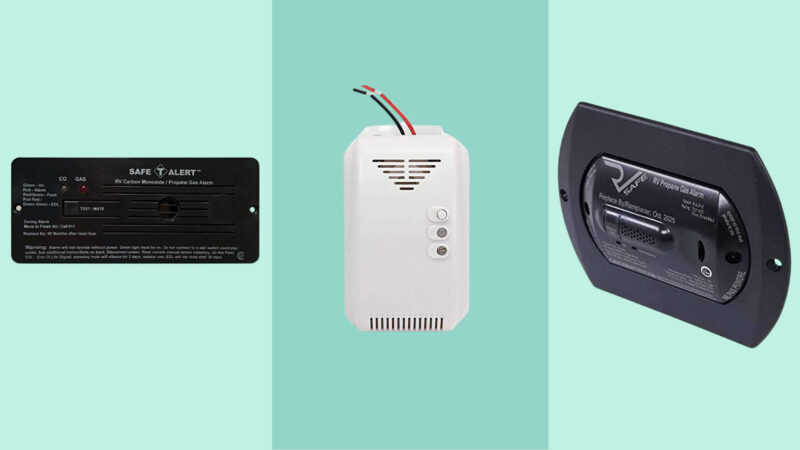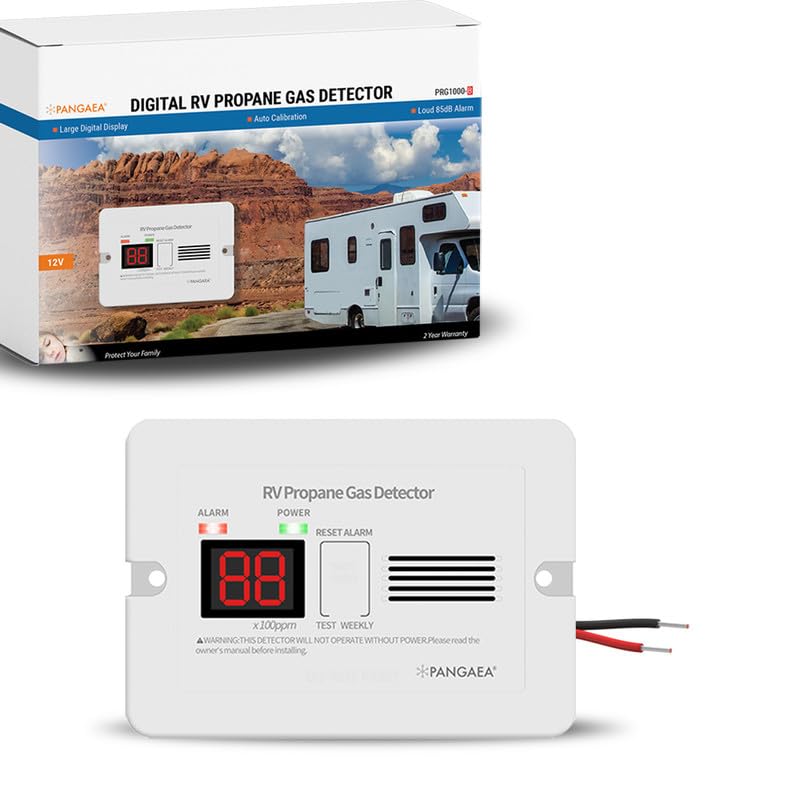Table of Contents Show
RVs often come with propane stoves, refrigerators, and water heaters. Propane is a dangerous gas that can quickly cause a dire situation in an RV. An RV propane detector can keep you and your loved ones safe. Do you need an RV propane detector in your RV? Let’s look and see!
Do I Need a Propane Detector in My RV?
An RV propane detector is a must-have piece of safety equipment.
You’re likely not going to find an RV rolling out of a factory without a propane detector.
If you’re purchasing a new RV, you should test the propane detector before towing your rig home.
We also highly recommend checking your propane detector at the start and end of each camping season.
This helps ensure that you and your fellow campers are safe from propane leaks during your adventures.
How Long Do RV Propane Detectors Last?
A typical RV propane detector will last approximately five to seven years before you need to replace them.
This is usually from the propane detector manufacturing date.
You may have a brand new RV, but the propane detector could already be a year old.
When you’re getting your rig and testing it for the first time, it’s best to check the propane detector’s expiration date.
This will be a date stamped on the sensor.
You may need to use a screwdriver to detach the propane detector from the wall to access this information.
Where Should a Propane Detector Be Placed in An RV?
Propane is heavier than air, which results in propane settling lower to the ground.
If you’re placing a propane detector in your RV, you want to put it low and near propane appliances.
RV manufacturers often install propane detectors in the kitchen space.
This helps ensure it can detect any propane refrigerator or stove leaks immediately.
Pro Tip: Not sure which of your appliances are propane? Your are not alone, learn how your RV propane system works.
Upgrade Your RV Propane Detector
You don’t want to trust just any propane detector to keep you safe. You want the best!
If you need to upgrade or replace your existing or expired propane detector, we’ve found some fantastic options for you to consider. Let’s take a look!

Our Choice: Safe-T-Alert Dual LP/CO Alarm
- Double-Duty Alarm Detects Both Gas Leaks And Co Gas Simultaneously
- Reliable 12V Power Means No Missing Or Dead Batteries To Replace. Operating Temperature: -40° F To +158° F
The Safe-T-Alert by MTI Industries is as good as it gets for propane detectors in RVs.
These units monitor for propane and carbon monoxide, and they look good too.
The sleek black design fits snugly to the wall and will keep you and your loved ones safe while going unnoticed.
It connects directly to your RV’s 12-volt system so that you won’t worry about constantly checking batteries.
Pro Tip: Going camping in the cold and running your furnace? You’ll want to keep an eye on it, they can be deadly.
Runner Up: RV Safe Propane Gas Alarm
- Alarm Type: 2-Wire Propane Gas Alarm
- Surface mount
This RV Safe Propane Gas Alarm monitors propane and carbon monoxide.
You can easily connect this alarm to your RV’s 12-volt system with only two wires.
It also comes with two mounting brackets that help provide a flush and natural look inside your rig.
With the press of a button, you can test this unit to ensure it’s in good working condition.
This unit also has distinct alarm indicators to help you know whether the alarm is for carbon monoxide or propane.
Keep in Mind: Looking for the best RV propane hoses? We’ve got you covered. Check out these RV propane hoses.
Runner Up: PANGAEA RV Propane Gas Alarm
- HIGHLY RESPONSIVE GAS SENSOR – PANGAEA RV gas detectors use highly-sensitive semiconductors to provide faster, more...
- REAL-TIME DIGITAL DISPLAY – This gas detector for RV use features a digital screen that shows real-time concentrations...
The PANGAEA RV Propane Gas Alarm screams to 85 decibels when it detects propane inside your RV.
It is important to note that this unit only detects propane, which means you’ll need an additional alarm to monitor for carbon monoxide or any other dangerous gasses.
The digital display gives you an accurate reading of the current levels of propane detection. In an emergency, the screen will also display warning codes.
This is the perfect addition for anyone looking to protect their rig from issues regarding propane leaks.
Budget Option: AinDen LP Detector
The AinDen LP Detector can use your RV, boat, or van’s 12-volt system to power this alarm.
It monitors gases like propane, methane, natural gas, coal gas, gas fuel, etc.
When the unit detects the presence of dangerous gas, the alarm will sound, and an LED will flash.
The size and shape of this propane detector match the typical size and shape used by many RV manufacturers.
This makes replacing an expired detector in your rig very simple.
Bonus: Portable Gas Leak Detector
- WIDE DETECTION RANGE: Detect gas concentrations from approximately 50 to 10,000 ppm* (*based on Methane) for versatile...
- ADJUSTABLE SENSITIVITY: Choose between High (50 to 1000 ppm) and Low (1000 to 10,000 ppm) sensitivity levels for...
The Klein Tools ET120 is a portable gas leak detector. This device doesn’t constantly monitor your RV, but it can help you locate leaks in your RV’s propane system.
If you suspect a hose or connection is leaking gas, you want to get it fixed immediately.
HVAC experts often use these devices, but they are a great item to add to the tools you keep in your RV.
Keep in Mind: If you’re in search of a carbon monoxide detector, you’ll want to see this. We found the best RV carbon monoxide detectors.
What to Do If Your RV Propane Detector Goes Off
If your RV propane detector goes off, you should immediately evacuate everyone from your RV, including pets.
Turn off your propane tanks and leave the front door wide open.
If you notice the smell of propane, you may want to alert the campground staff.
They may call the local fire department to inspect the scene.
Once you resolve the situation and discover the cause of the alarm, open all the windows and vents in your RV.
You want to get fresh, clean air into your rig and eliminate any toxic gas that could remain inside.

Can a Fart Set Off a Propane Detector?
RV propane detectors monitor the air for propane and natural gas levels containing methane.
Farts from humans and even pets also have methane.
It’s not uncommon for RVers to share that their dog farted and set off their propane detector.
You don’t hear as often about human farts doing it, but that’s likely because most people aren’t letting it rip next to the propane detector.
You don’t have to worry if your pet or significant other habitually sets off your propane detector, but you may consider avoiding baked beans during camping adventures.
Stay Safe With An Up to Date RV Propane Detector
Safety equipment can only keep you safe if it’s in adequate working condition.
The more time you spend in your RV, the more often you should check your safety equipment, including your RV propane detector.
If left undetected, some gases can cause death and even a severe explosion.
Sadly, there have been many tragedies resulting from toxic gases entering RVs.
When’s the last time you tested your RV propane detector?
Last update on 2025-01-19 / Affiliate links / Images from Amazon Product Advertising API










